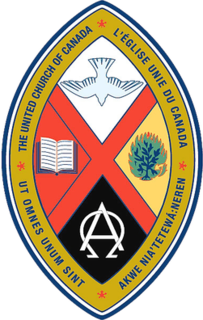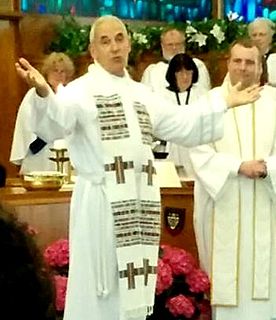Related Research Articles

In certain Christian churches, holy orders are the ordained ministries of bishop, priest (presbyter), and deacon, and the sacrament or rite by which candidates are ordained to those orders. Churches recognizing these orders include the Catholic Church, the Eastern Orthodox, Oriental Orthodox, Anglican, Assyrian, Old Catholic, Independent Catholic and some Lutheran churches. Except for Lutherans and some Anglicans, these churches regard ordination as a sacrament. The Anglo-Catholic tradition within Anglicanism identifies more with the Roman Catholic position about the sacramental nature of ordination.

Methodism, also called the Methodist movement, is a group of historically related denominations of Protestant Christianity which derive their doctrine of practice and belief from the life and teachings of John Wesley. George Whitefield and John's brother Charles Wesley were also significant early leaders in the movement. They were named Methodists for "the methodical way in which they carried out their Christian faith". Methodism originated as a revival movement within the 18th-century Church of England and became a separate denomination after Wesley's death. The movement spread throughout the British Empire, the United States, and beyond because of vigorous missionary work, today claiming approximately 80 million adherents worldwide.

John Wesley was an English cleric, theologian, and evangelist, who was a leader of a revival movement within the Church of England known as Methodism. The societies he founded became the dominant form of the independent Methodist movement that continues to this day.

The United Church of Canada is a mainline Protestant denomination that is the largest Protestant Christian denomination in Canada and the second largest Canadian Christian denomination after the Catholic Church in Canada.

The Methodist Episcopal Church (MEC) was the oldest and largest Methodist denomination in the United States from its founding in 1784 until 1939. It was also the first religious denomination in the US to organize itself on a national basis. In 1939, the MEC reunited with two breakaway Methodist denominations to form the Methodist Church. In 1968, the Methodist Church merged with the Evangelical United Brethren Church to form the United Methodist Church.

James Shaver Woodsworth was a pre–First World War pioneer of the Canadian Social Gospel, a Christian religious movement with social democratic values and links to organized labour. He was a long-time leader and publicist in the movement and was an elected politician under the label, serving as MP from 1921 to his death in 1942. He helped found the Co-operative Commonwealth Federation (CCF), a forerunner of today's New Democratic Party (NDP), in 1932.
James Endicott was a Canadian church leader, missionary and administrator. He was born in Devon, England and came to Canada at the age of 17. He studied at Wesley College in Winnipeg, Manitoba and was ordained as a Methodist minister in 1893. He was elected Moderator of the United Church of Canada by the 2nd General Council in Montreal, Quebec, in 1926.

George Campbell Pidgeon was a Christian minister, first in the Presbyterian Church in Canada and then in the United Church of Canada, as well as the last Moderator of the Presbyterian Church before amalgamation and the first Moderator of the newly formed United Church of Canada. He was a strong proponent of the proposed union of churches and later in life championed ecumenism.

The Presbyterian Church in Canada is a Presbyterian denomination, serving in Canada under this name since 1875. The United Church of Canada claimed the right to the name from 1925 to 1939. According to the Canada 2001 Census 409,830 Canadians identify themselves as Presbyterian, that is, 1.4 per cent of the population.

Knox Presbyterian Church is a Presbyterian Church in Ottawa, Ontario, Canada. It is named after John Knox, a founder of Presbyterianism in Scotland.
Walter George Brown was a Presbyterian Church in Canada minister who opposed the formation of the United Church of Canada and was a United Reform Movement MP in the House of Commons of Canada.
N. Bruce McLeod is a former Moderator of the United Church of Canada (1972–1974). He has a doctorate in preaching from Union Theological Seminary in New York.

The Companions of the Cross (C.C.) is a Society of Apostolic Life based in Ottawa, Ontario. It is a community of Roman Catholic priests that is Eucharistic, Charismatic, Marian and Magisterial. It was founded by Father Robert Bedard and was approved in 2003 by the Vatican as a Society of Apostolic Life. Fr. Roger Vandenakker is currently serving as the community's General Superior.

Methodist views on the ordination of women in the rite of holy orders are diverse.

Gary J. Paterson was the Moderator of the United Church of Canada from 2012 to 2015. He was the first openly gay person to take the post since the church was formed in 1925 and the first in the world to lead a major Christian denomination.

William Briggs was an Irish-born Canadian Methodist minister and publisher. His popularity as a preacher led him to become pastor of Metropolitan Church in Toronto. As book steward from 1879 to 1918 the Methodist Book and Publishing House became one of Canada's most prominent publishing houses; after he stepped down it was renamed Ryerson Press.
Wilbur Kenneth Howard was the first black person to be ordained as a minister in the United Church of Canada and, in 1974, became the denomination's first black moderator. He was elected Moderator after the fifth ballot during the meeting of the 26th General Council in Guelph, Ontario. To date, he is the only black person to hold this position within the United Church of Canada.
Richard Bott is the current Moderator of the United Church of Canada.
Very Rev John Norman (Jack) MacLeod DD (1926–2002) was a 20th-century minister of the Free Church of Scotland who served as Moderator of the General Assembly 1983/84. He had the Gaelic nickname "Casan-Sofa".

Anne Marguerite Squire née Park (1921–2017), 31st Moderator of the United Church of Canada from 1986 to 1988, was the first female lay person elected to that post. Her time as Moderator was marked by controversy over the question of whether members of the LGTBQ community should be ordained.
References
- ↑ "Historical Timeline: 1930's". The United Church of Canada. United Church of Canada. Archived from the original on 2010-11-29. Retrieved 2015-09-13.
- 1 2 3 4 5 St. John, Judith; Metropolitan United Church (1988). Firm Foundations: A Chronicle of Toronto's Metropolitan United Church. Wood Lake Books. Retrieved 2015-09-13.
- 1 2 "Church facing greatest challenge, leader says". The Ottawa Citizen. 96 (82). The Canadian Press. 20 September 1938. Retrieved 2015-09-22.
- ↑ "Church leader addresses rally". Toronto Daily Star. The Canadian Press. 21 November 1938.
| Religious titles | ||
|---|---|---|
| Preceded by Richard Roberts | Moderator of the United Church of Canada 1936–1938 | Succeeded by John W. Woodside |